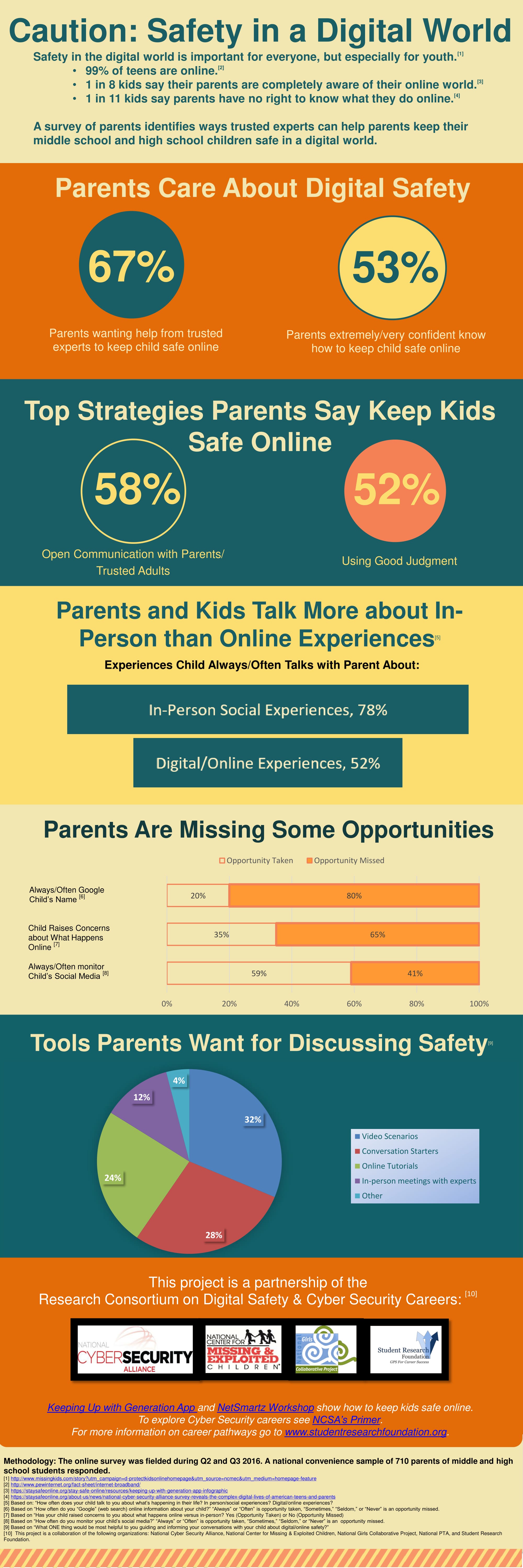Research Findings: What Parents Think They Know about Protecting their Children Online
In 2018, the Student Research Foundation partnered with the Research Consortium on Digital Safety & Cyber Security Careers to complete “Caution: Safety in a Digital World,” a survey of 710 parents of middle school and high school students. Our researchers asked those parents what they knew about protecting their children online, what they thought they knew, and more.
Here is a summary of our findings . . .
How Secure Do Parents Feel About Protecting their Children?
- 67% of parents want help from trusted experts to keep their children safe online
- 53% are extremely confident that they know how to keep their children safe online
What Strategies Do Parents Believe Will Help?
- 58% of parents think that open communication with parents or trusted adults will keep their children safe online
- 52% think that “using good judgment” is what is needed
Parents and Children Discuss In-Person Contacts More Often than Online Encounters
- 78% of parents believe their children talk to them about in-person social experiences they have had
- 52% believe their children talk to them about digital/online encounters and experiences
How Are Parents Monitoring their Children’s Online Activities?
- 20% of parents say they Google their child’s name
- 35% become involved when a child expresses concerns about what happens online
- 55% monitor their child’s use of social media
What Tools Would Parents Like to Help them Understand More about Online Safety?
- 32% of parents would like access to video surveillance tools
- 28% would like to learn “conversation starters” they can to use when discussing online safety with their children
- 24% would like online tutorials about online safety
- 22% would like in-person meetings with cybersecurity experts
Interpreting the Survey Findings
Some of the survey’s findings are troubling – why, for example, are 53% of parents extremely confident that they already know how to keep their children safe online? It also seems troubling that only 52% of parents reported that their children talked with them about online contacts and experiences.
Many schools address their concerns about online safety by presenting school assemblies that are conducted by members of local law-enforcement agencies, or by cybersecurity consultants. Another option is to show a video on cybersecurity. One video that is appropriate for middle and high-school students, for example, is “Internet Security for Youth,” produced by the WNS Cares Foundation.
In a short amount of time, assemblies and presentations can teach valuable safety concepts to students and teachers. However, there could be a danger in giving one such presentation at the start of a school year and then believing that your school has sufficiently covered the issue of cybersecurity.
Safety depends on the constant vigilance of teachers, parents, and administrators, who should step in as soon as they see students engaging in risky behavior online. In addition, regular assemblies with students throughout the school year can help keep them aware of safety protocols they should follow.
To Learn More about Career Planning and Jobs of the Future
We invite all students to explore their career options by participating in our career and college research studies. Students who complete the free career test for high school students will receive information on college and career opportunities which match their interests.
Get all the digital safety/cybersecurity research in the following infographic.











Leave a Reply
Want to join the discussion?Feel free to contribute!